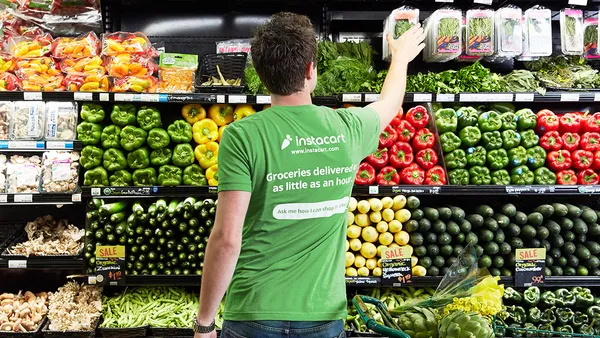Dive Brief:
- While Instacart won praise for its recent decrease in membership and delivery fees for customers, many of Instacart’s contracted shoppers believe this has come at the expense of their earnings. Hundreds of Instacart’s 70,000 shoppers have taken to social channels to call for a boycott over what they deem unfair wages, Business Insider reported.
- Changes in pay structure for shoppers were announced in October and will be rolled out in all Instacart markets by the end of the year. With the new structure, shoppers can see previews of items requested, travel distance for the order and total pay for each job before they accept or reject the work. Instead of being paid a flat delivery fee, Instacart will now pay shoppers a "batch incentive" fee and a $0.60 per mile commission for a total “batch payment,” which will vary based on each order.
- One shopper told Business Insider that they made twice as much before these changes occurred, especially on heavy deliveries that are now compensated inconsistently. Several shoppers are unhappy with the new way Instacart factors customer tips into their total earnings, suggesting that the company pays them depending on the size of a tip, which can cut into their total pay.
Dive Insight:
Word of disgruntled Instacart shoppers first surfaced on Buzzfeed before Thanksgiving, with many calling for a soft strike in response to the new pay structure. The strike included refusing jobs that shoppers felt would be poorly paid, such as fulfilling orders with heavy or cumbersome items, or shopping at locations where parking is difficult.
Although the comments are negative as shoppers speak to media and post to Reddit and Twitter, it appears to be a vocal minority, and with the exception of a few customer complaints on Twitter about delayed orders, the boycott does not seem to be causing any major service issues at this point.
This isn’t the first time Instacart has clashed with shoppers over their earnings. In 2016, the company removed the customer tipping option completely, and replaced it after major backlash. Shortly after, the company was accused of withholding tips from its shoppers.
Instacart says made these latest changes with direct input from shoppers in test markets.
“Over the last six months, we’ve deepened our commitment to improving the experience of our dedicated community of 70,000 shoppers," a spokesperson from Instacart told Grocery Dive in an email. "Being an Instacart shopper requires a unique mix of care, speed, quality and personal communication with customers. We're carefully and deliberately testing every new feature with shopper focus groups in cities of all sizes to gather their feedback along the way. This approach allows us to calibrate our shopper tools and features based on their experience."
The spokesperson said that the company understands that a group of shoppers in the community has voiced concerns about some of the new earning features, which were rolled out more broadly in November.
“We want to be clear that every shopper and every order matters to us, and we take all feedback seriously. Whether it’s an issue with a specific batch or a broader concern, we encourage shoppers to provide feedback to our Shopper Support team directly. We’re committed to looking into every issue that our shoppers raise to better understand how we can improve our features and create the best possible shopper experience,” the spokesperson said.
The new structure has been introduced gradually, with shoppers being updated along the way. In May, Instacart first posted to its shopper blog on Medium about recent shopper feedback and possible changes in the way earnings are calculated to provide more transparency. The company officially introduced the new earnings structure on the blog in October, and further clarified some of the new features in November.
Instacart seems to be making efforts to repair its image through transparency and treating the new system as a work in progress. But until the kinks are worked out with the new compensation system, complaints will likely continue and could even escalate into broader service disruptions.













